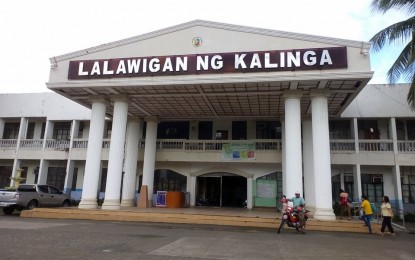
Facade of the Kalinga Provincial Capitol (Photo by Liza T. Agoot)
TABUK CITY, Kalinga -- Officials of Kalinga province, the Cordillera Regional Peace and Order Council (RPOC), and the Regional Development Council (RDC) have called on members of the Lubo and Tulgao tribes of Tanudan and Tinglayan towns of Kalinga to keep calm to prevent a possible full-blown tribal war and further harm to other tribe members.
Kalinga Vice Governor James Edduba, who is also a member of the Tulgao tribe, said Friday their tribe's elders have advised their members to stay home and avoid any confrontation, encounter, or meeting with Lubo tribe members. He said the advice was made as a courtesy because their tribe is considered the perpetrator of an ongoing conflict with the Lubo tribe.
On June 30, two members of the Tulgao tribe allegedly shot to death a farmer and seriously wounded his brother in front of a store in Purok 4, Bulanao City, Tabuk City, Kalinga. Both victims belonged to the Lubo tribe, triggering the tribal conflict.
Last Tuesday, one of the suspects surrendered, while the other remained at large, supposedly in the custody of his tribe.
“Our advice to the members of Tulgao: Do not go out to prevent any encounter and so there will be no other victims," Edduba told the Philippine News Agency (PNA) in the Ilocano dialect. "From us, the Tulgao side, where the suspect belongs, we hope that our brothers from Lubo will not avenge, to prevent the escalation of the conflict.”
Edduba explained that as a rule, amid tribal conflicts, students who belong to the conflicting tribes automatically stop going to school and the workers do not report for work.
He said while this might not be unacceptable to others, it is an unwritten rule in the province as a preventive measure to avoid the possibility of getting more people hurt.
“Sapay kuma ta maiturung kuma nga napintas ti papanan na daytoy (We hope these will all lead to a good result),” Edduba said, referring to the actions being undertaken by the officials, law enforcement, and the tribal leaders, including the Kalinga Bodong (Peace) Council (KBC).
The vice governor said members of other tribes neutral to the conflict and who are also members of the KBC have likewise called for sobriety.
Edduba added that tribe members who were former elected officials of the province are helping control the situation, too.
According to him, Kalinga Governor Jocel Baac had expressed hope that with the backdoor negotiations, the suspect who remains at large would surrender soon.
“Just like what the governor said, it is only when the suspect surrenders that formal negotiations under the indigenous system of settling disputes would commence,” he said.
Edduba related that during the last Bodong Summit in February, the various tribes agreed that settlement and negotiations would only happen after the suspect in an incident surrenders.
Kalinga province strongly adheres to the indigenous way of settling problems, applying the cultural practices, where “bodong holders” (peace pact holders), respected community elders, and the KBC play a major role in pacifying conflicting members, settling disputes, and assuring that tribe members adhere to peace agreements.
Baguio City Mayor Mauricio Domogan, who chairs the Cordillera RPOC and RDC, has also repeatedly asked the members of the aggrieved Lubo tribe in the city to stay calm and "allow the wheels of justice to move."
Many Ikalingas study and practice their professions in Baguio.
Domogan said he is thankful to the tribal leaders of the various Kalinga tribes for their prompt action on the matter and in heeding the local government's call to spare Baguio from a possible "spillover" of the tribal conflict.
“We are grateful to our brothers and sisters from the different tribes in Kalinga for heeding our call to sustain the declaration of Baguio and Benguet as peace zones because we do not want the unnecessary disruption of the prevailing peace and order situation in the city, " Domogan said. "We commend their desire for the maintenance of peace and order in the city, so that their employment and their studies here will not be affected by whatever violent actions done by their fellow tribe members.”
In 1993, Kalinga tribal elders and city and provincial officials of Baguio and Benguet signed an agreement declaring the two localities as peace zones in the region. Thus, any hostility triggered by tribal wars in Kalinga should not spill over to the city and the province.
The peace pact also spares professionals and students belonging to the feuding tribes from any tribal conflict so as not to interrupt their livelihood and studies. (PNA)
